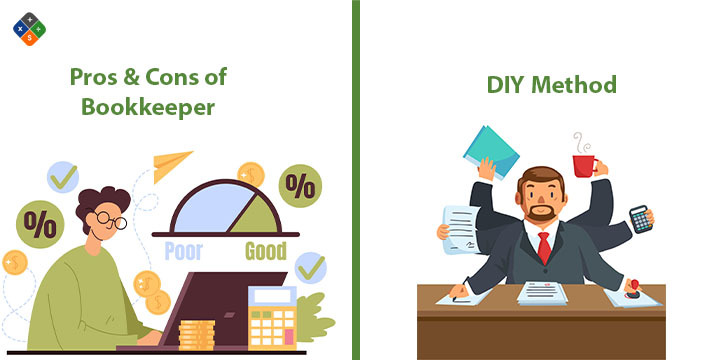- info@bookkeepingproservices.com
- 1390 W. 6th St. #120 Corona, CA 92882
Pros and Cons of Bookkeepers vs the DIY Method
sfsdfsdfsdf

Pros and Cons of Bookkeepers vs the DIY Method
Understanding bookkeeping is crucial for any small business, as it encompasses one of the most vital components. Regardless of whether you collaborate with a professional bookkeeper or handle it personally, comprehending the process is equally significant.
Both bookkeeping and DIY approaches have their advantages and disadvantages, along with important considerations to keep in mind. Let's explore the key information you should know about the pros and cons of both options.
Bookkeepers vs. DIY
You have two choices when it comes to bookkeeping: either hiring a bookkeeper or opting for the do-it-yourself (DIY) approach.
Initially, it may seem straightforward to categorize these options. Bookkeepers provide advantages, such as offering a comprehensive view of your bookkeeping. On the other hand, the DIY method, although more time-consuming, could potentially save you money. However, there are additional aspects to consider for both bookkeeping methods, which can complicate your decision-making process.
Below, you will find a list of the advantages and disadvantages associated with bookkeepers and the DIY method.
More Resources: Xero vs. QuickBooks: A Comprehensive Comparison for Small Businesses in the NY
Pros of a Bookkeeper
Whether you opt to engage the services of an external bookkeeper or employ one within your business, the advantages for small business owners are numerous.
To begin with, having an external bookkeeper ensures a clear separation from your business. This distinction grants you a more impartial perspective on your bookkeeping practices and the overall financial health of your business. Moreover, it allows you to benefit from valuable accounting assistance, enabling you to devote your attention to other critical aspects of your business operations.
Additionally, an external bookkeeper serves as a safeguard against potential problems. Bookkeeping issues can be extremely distressing, such as encountering an IRS audit or encountering errors in tax payments, whether overpayment or underpayment. By enlisting the services of a bookkeeper, you significantly reduce the likelihood of encountering such problems.
Furthermore, an internal bookkeeper provides convenient access to your bookkeeping records whenever needed. This accessibility translates to savings in both time and money. An internal bookkeeper also possesses an intimate understanding of your business and is well-versed in the specific transactions that may pose challenges or complications.
Pros of DIY Bookkeeping
If you choose to handle your bookkeeping on your own, there are several benefits to consider.
One major advantage of opting for the do-it-yourself (DIY) approach is the cost savings. By taking charge of your own bookkeeping, you eliminate the need to hire someone and pay for their services. This is particularly beneficial if you are already comfortable with tasks such as tax filing, document organization, and working with the necessary bookkeeping software.
Another advantage of the DIY bookkeeping method is the preservation of privacy in your business records. This aspect is of great importance to many businesses that prioritize safeguarding the privacy of both their customers and employees.
Featured Resources: Bookkeeping Basics for Small Business Owners
Cons of a Bookkeeper
While having a bookkeeper, whether they are hired externally or within your company, offers convenience, there are drawbacks associated with their involvement.
When you decide to hire an external bookkeeper for your business, one potential downside is their potential preference for using different bookkeeping software than what your business currently utilizes. They might insist on using their own software, which can lead to compatibility issues and complications.
Another disadvantage of working with a bookkeeper relates to the bookkeeping process itself, especially when dealing with an internal bookkeeper. Mistakes can occur during the bookkeeping process, as the internal bookkeeper may not possess comprehensive knowledge of your industry's specific requirements. Consequently, financial transactions can be affected, and you may have to invest additional time in assisting them.
Furthermore, regardless of whether you opt for an external or internal bookkeeper, time constraints remain a concern. Your bookkeeper may not have access to all your financial records when it comes time to submit them, or there is a possibility that you might unintentionally overlook an important transaction. Additionally, in the event of a business audit, you may need to locate specific documents, further adding to time pressures. All of these factors can accumulate, resulting in significant time limitations.
Cons of DIY
There are drawbacks associated with undertaking bookkeeping on your own. If you choose to handle your bookkeeping needs independently, there are several disadvantages that you should take into account.
By opting to DIY your bookkeeping, you'll need to remember to maintain meticulous records of all your receipts and transactions. In addition to managing your business operations, you'll also shoulder the responsibility of handling the administrative aspects of your finances. This can significantly drain your time, which would be better utilized for business expansion or marketing endeavors.
The process of collecting, locating, and organizing your financial transactions can consume hours of your valuable time. Uploading this information to bookkeeping software can take even more hours. Moreover, rectifying mistakes, especially if you receive feedback from the IRS, can be an even lengthier process.
Furthermore, unless you possess professional bookkeeping experience, the likelihood of making errors in your records is quite high. These mistakes could result in inaccurate information on your taxes, potentially leading to fines or even an audit.
While handling your own bookkeeping might provide minor cost savings in the short term, it could ultimately prove to be expensive if errors occur along the way.
Instead of investing time in deciphering bookkeeping intricacies or risking costly mistakes in your financial statements, it is advisable to consider hiring a professional bookkeeper.
A professional bookkeeper can address any inquiries you may have, organize your financial records efficiently, and ensure that your tax paperwork is accurate and prepared well in advance of the tax season.

